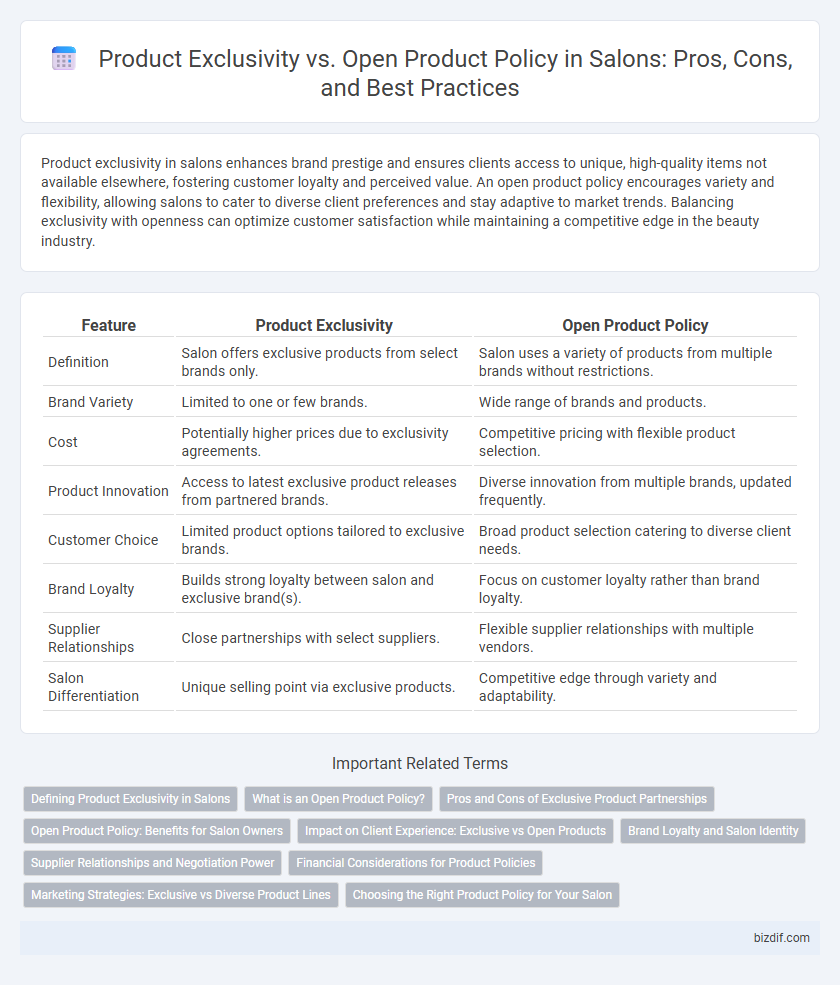Product exclusivity in salons enhances brand prestige and ensures clients access to unique, high-quality items not available elsewhere, fostering customer loyalty and perceived value. An open product policy encourages variety and flexibility, allowing salons to cater to diverse client preferences and stay adaptive to market trends. Balancing exclusivity with openness can optimize customer satisfaction while maintaining a competitive edge in the beauty industry.
Table of Comparison
| Feature | Product Exclusivity | Open Product Policy |
|---|---|---|
| Definition | Salon offers exclusive products from select brands only. | Salon uses a variety of products from multiple brands without restrictions. |
| Brand Variety | Limited to one or few brands. | Wide range of brands and products. |
| Cost | Potentially higher prices due to exclusivity agreements. | Competitive pricing with flexible product selection. |
| Product Innovation | Access to latest exclusive product releases from partnered brands. | Diverse innovation from multiple brands, updated frequently. |
| Customer Choice | Limited product options tailored to exclusive brands. | Broad product selection catering to diverse client needs. |
| Brand Loyalty | Builds strong loyalty between salon and exclusive brand(s). | Focus on customer loyalty rather than brand loyalty. |
| Supplier Relationships | Close partnerships with select suppliers. | Flexible supplier relationships with multiple vendors. |
| Salon Differentiation | Unique selling point via exclusive products. | Competitive edge through variety and adaptability. |
Defining Product Exclusivity in Salons
Product exclusivity in salons refers to the practice of offering specific haircare, skincare, or beauty products that are available solely through the salon, often branded or formulated by high-end manufacturers. This strategy enhances the salon's brand identity, attracts clients seeking unique or premium products, and increases customer loyalty by providing items not found in retail stores or online marketplaces. Exclusive product lines often come with specialized training for salon staff, ensuring expert knowledge and personalized recommendations that distinguish the salon's service quality.
What is an Open Product Policy?
An Open Product Policy in salons allows the use of a wide range of hair and beauty products rather than restricting services to specific brands. This approach offers flexibility for stylists to tailor treatments based on individual client needs and preferences, enhancing customer satisfaction. Salons adopting this policy can attract diverse clientele by providing varied product options, promoting inclusivity and innovation in service offerings.
Pros and Cons of Exclusive Product Partnerships
Exclusive product partnerships in salons enhance brand prestige and customer loyalty by offering unique, high-quality items unavailable elsewhere, driving repeat visits and higher profit margins. However, these exclusive agreements can limit product variety, potentially alienating clients who prefer a broader selection, and increase dependency on a single supplier, which may pose inventory risks. Balancing exclusivity with client preferences and supplier reliability is crucial for sustained salon success.
Open Product Policy: Benefits for Salon Owners
An open product policy allows salon owners to offer a diverse range of brands and products, enhancing customer choice and satisfaction. This flexibility helps salons cater to varied hair types and preferences, leading to increased client retention and referrals. Access to multiple suppliers also enables competitive pricing and the ability to quickly adopt emerging trends, driving overall business growth.
Impact on Client Experience: Exclusive vs Open Products
Exclusive salon products create a premium client experience by offering unique formulations and higher quality ingredients unavailable elsewhere, which can boost customer loyalty and perceived value. Open product policies provide clients with a wider selection and the freedom to choose familiar or preferred brands, enhancing satisfaction through customization. Balancing exclusivity and openness influences client retention and satisfaction by either emphasizing uniqueness or versatility in service offerings.
Brand Loyalty and Salon Identity
Product exclusivity in salons strengthens brand loyalty by creating a unique identity tied to specific high-quality lines, encouraging repeat visits and customer trust. An exclusive product range differentiates the salon, fostering a distinct brand image that attracts clients seeking specialized care. Conversely, an open product policy offers variety but may dilute the salon's identity and weaken long-term customer allegiance due to inconsistent brand messaging.
Supplier Relationships and Negotiation Power
Product exclusivity in salons fosters stronger supplier relationships, enabling priority access to premium supplies and favorable payment terms. Exclusive agreements often enhance negotiation power by ensuring consistent purchase volumes, which suppliers value for stability. In contrast, an open product policy diversifies supplier options but may dilute negotiation leverage due to fragmented purchasing.
Financial Considerations for Product Policies
Product exclusivity in salons often results in higher profit margins due to premium pricing and brand partnerships, while open product policies may reduce costs by sourcing competitively priced, diverse brands. Exclusive arrangements can lead to improved customer loyalty and repeat sales, yet may require substantial upfront investment and limit flexibility in inventory management. Open policies enable salons to adapt quickly to market trends and customer preferences, potentially increasing sales volume but with lower per-unit profitability.
Marketing Strategies: Exclusive vs Diverse Product Lines
Salon marketing strategies leverage product exclusivity to build brand prestige and customer loyalty through unique, high-quality offerings unavailable elsewhere. Conversely, an open product policy promotes diverse product lines to attract broader demographics and encourage frequent purchases by providing varied choices. Balancing these approaches depends on target market analysis, with exclusivity driving premium perception and open policies enhancing accessibility and volume sales.
Choosing the Right Product Policy for Your Salon
Selecting the right product policy for your salon impacts client experience and brand identity significantly. A product exclusivity approach enhances brand prestige and cultivates client loyalty by offering unique, high-quality items unavailable elsewhere. Conversely, an open product policy provides flexibility, allowing salons to adapt to diverse customer preferences and expand their retail offerings.
Product Exclusivity vs Open Product Policy Infographic

 bizdif.com
bizdif.com